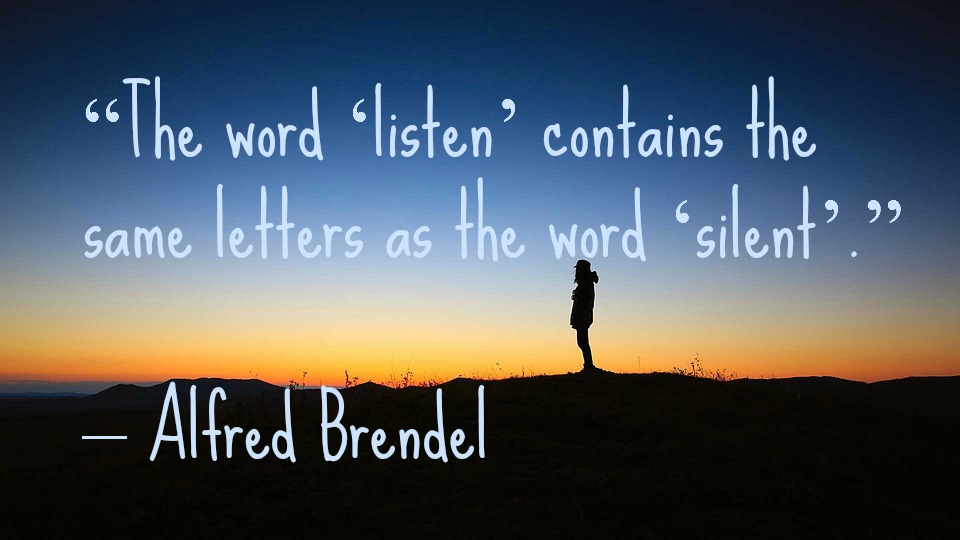“Trust what you hear when you listen.”
— This is a line repeated in the Japji (Song of the Soul), as translated from the original Sanskrit.
What does it mean to truly listen? And, to trust what you hear? In this new moon’s edition of Soul Notes, we dig into this spiritual concept and practice.
Truly Listening
Truly listening — to the sounds of your soul, and to the souls of others – is what allows trust to develop. It cuts through the egoic, often times camouflaged or staged fronts that come from the mind. It’s a matter instead of tuning into the heart.
“Trust what you hear when you listen.” – Japji
Trusting what you hear when you listen means listening for and trusting your intuition: Your inner truth will sound beautiful, satisfying, and fulfilling – you know, “the nodding your head, ‘uh-huh’ ” kind of truth. It will ring true – it will be harmonic and resonant. With practice, you’ll notice and KNOW the difference.
When you’re truly listening, your truth will be recognizable by its purity. It will sound and feel loving and expansive. In contrast, your inner untruth will sound false, faulty, and anything but resonant. You’ll feel yourself contracting or worse yet fleeing from your peaceful, respite place. It will seem as if someone suddenly changed the serenity channel to something that grates on your nerves, throws you off-balance, and disrupts your inner harmony. That, dear one, is the critical mind calling – don’t pick up that call! Let it go to your spiritual trash bin to be discarded and composted away. There’s no space for it in your inner sacred harmonic energy field. Say to it, “No Thank You — There’s no room for you at THIS inn”!
Or, it may not sound critical per se – yet, it may nonetheless still sound or feel “off,” meaning that it’s not the sound of your own voice calling, but that of someone else. What you’re hearing may be their truth, but not what’s true for YOU. This takes discernment. With practice also comes discernment.
As with most things worth your devotion and attention, trusting what you hear when you listen takes consistent, ongoing practice. Fine tuning your listening skills and hearing what your intuition has to say — to reveal, and to divulge to you from your innermost being – that wisest part of you — gets stronger and stronger over time and with frequent repetition. Accordingly, leaving it alone too long between sessions, without engagement, results in it becoming out of tune just like a piano, guitar or violin. So, keep at it! It’s worth it.
The benefits and ways to get started:
To be able to trust fully in what you hear when you listen, it helps to get quiet, still, and free from distractions if at all possible. Dedicating even a few minutes a day to this practice will engender worthy results. Bring your full presence to the moment at hand. Engage your mind, body (your heart) and soul. Tune into the silence, and be open to hear what comes through the quiet solitude. Treat this as your own soul session, your own meditation, just for you! Listen for the voice of the DIVINE WITHIN yourself!
Allow words, images, symbols, or even just a ‘hunch’ or a ‘gut feeling’ to come through. Some messages will gain further meaning afterwards, maybe even hours or days later. What’s important is setting the scene so that you truly hear the messages. You can decipher them over time. There’s no rush, only devotion, dedication, to spirit, and the messages and meanings that are intended for you.
Feel free to journal what comes through – or draw, or compose a poem or sing a song…whatever feels best for you to express what you heard.
Listening this way is what truly allows divine messages to come through. Deep understanding results. Then, you can take action from THAT place, and not from a place of disruptive self-flagellation, and nasty untruths. Inspired action feels enlivening, and uplifting, and not disheartening. Heart engaged? Check! All soul systems go! Use THAT as your energetic and spiritual launching pad. That is: Divine Lift-Off.
Your soul and the divine are available to you “24-7” – you just need to connect via the proverbial wi-fi. It’s one of the special, beautiful technologies uniquely available to us as human, spiritual beings. It’s already encoded within you. Embrace it. Enjoy it. Welcome it in all its glory.
Given any situation you may be contemplating, or for which you seek clarity: Surrender yourself to the experience. And, be prepared to and do, take inspired action based on your new, finely tuned, receptivity. As from a stone skipping across a pond, circles of understanding will continue to ripple outward from within.
For your consideration:
I leave with you these words, from the Japji:
“Trust what you hear
When you listen,
And bring all your loved ones
Along.
Trust what you hear
When you listen,
You will swim across
All difficulties
And your very presence
Will carry others
Across as well.”
Okay, your turn:
In what ways have you been tuning in and listening for your own truth? What do you notice when you get still, quiet, and really listen?
I invite you to share your thoughts, feelings, and experiences by leaving a Reply in the Comments section, below. Soul-to-soul!



Leave a Reply
Want to join the discussion?Feel free to contribute!